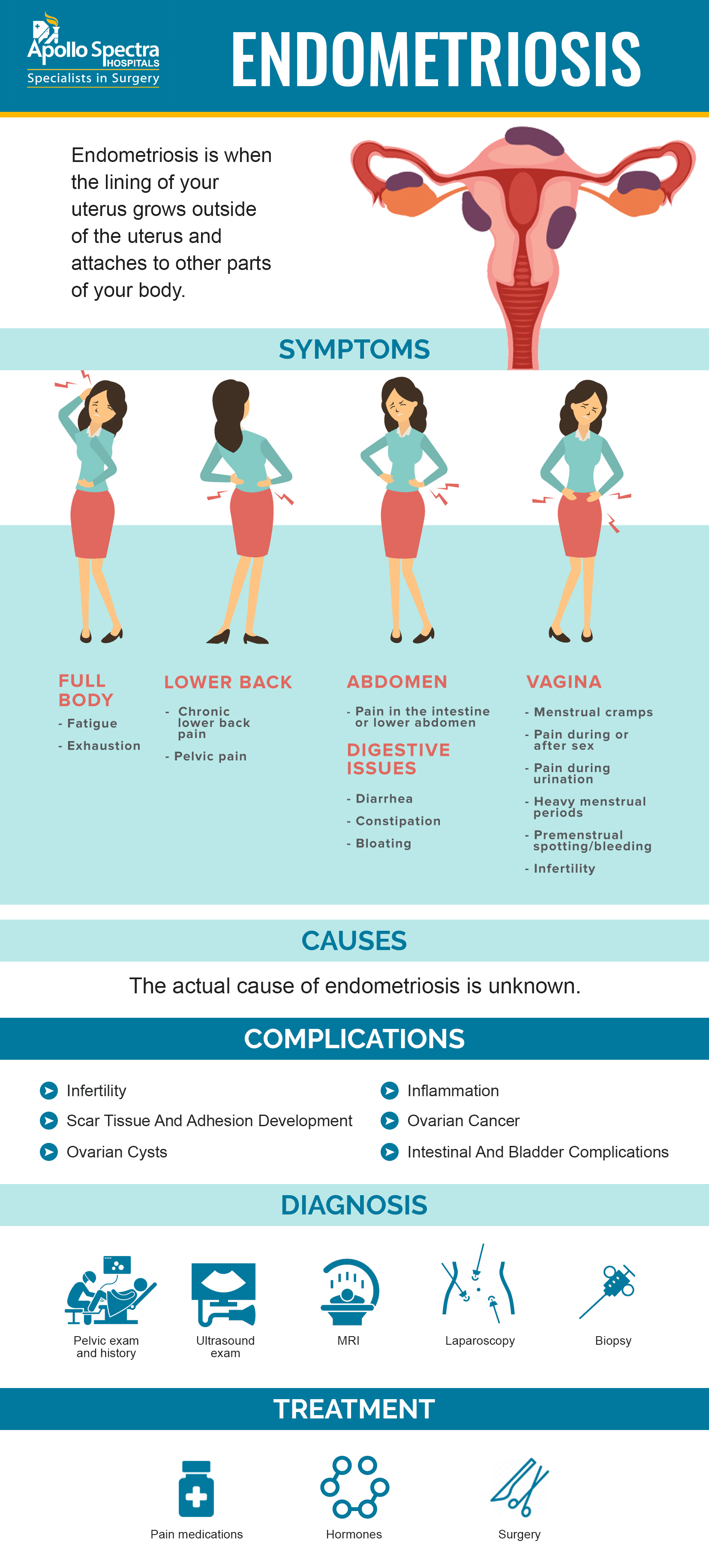What is Endometriosis and its key Symptoms & Causes?
May 21, 2019
Endometriosis is when the lining of your uterus grows outside of the uterus and attaches to other parts of your body. If not treated, it can cause complications, such as infertility, ovarian cancer, ovarian Cysts, inflammation, scar tissue and adhesion development and intestinal and bladder complications. This is a condition which results in the presence of endometrial implants, which consists of tissues usually, found in the uterus, in other body parts. With thickening and breaking down of the tissue, endometriosis continues to grow deeper in the body. The tissues bleed during menstrual cycles and respond to hormones as well. This causes adhesions and scar tissues to form, resulting in organ fusion and changes in anatomy.

What is endometriosis?
Endometriosis is known to cause cramping and pain, which can be severe at times, particularly while menstruating. It can potentially cause difficulties when the affected individual wants to conceive.
The condition occurs when the endometrium, the tissue lining the inside of the uterus starts growing outside of it. Despite growing outside, the endometrium still behaves the way it is supposed to during periods. Hence, when the menstrual cycle ends, the tissue bleeds after breaking apart.
The problem arises because there is no place for the blood from the tissue to go. As a result, the surrounding regions get swollen or inflamed, resulting in the development of lesions and scar tissue.
Symptoms
Pain in the pelvic region is the main symptom of the condition and it usually comes with menstrual cycles. Cramps during menstruation are normal, however, the pain is much worse for those having endometriosis. The pain can even worsen over some time. Some common symptoms and signs associated with the condition include:
- Dysmenorrhea or painful menstruation: Cramps and pain in the pelvic region start even before a period and last many days. Abdominal aches and lower backaches are also common.
- Pain during intercourse: Individuals with endometriosis often experience painful intercourse.
- Pain during urination or bowel movements: Likeliness of such pain is high during menstrual periods.
- Too much bleeding: Occasionally, you may experience heavy periods or intermenstrual bleeding (bleeding between menstrual cycles).
- Infertility: Endometriosis is known to be a common cause of infertility. It is often diagnosed as a part of infertility treatment
- Other symptoms and signs: Other symptoms you may experience if you have endometriosis include fatigue, constipation, diarrhea, nausea or bloating, particularly while menstruating.
The extent of your condition isn’t necessarily indicated by how severe the pain is. There are chances of experiencing severe pain with mild endometriosis or even little to no pain with advanced endometriosis.
At times, endometriosis can be mistaken for other medical conditions that also cause pain in the pelvic region, including ovarian cysts and PID (pelvic inflammatory disease). It can also be confused with IBS (irritable bowel syndrome) which is known to cause constipation, abdominal cramps, and diarrhea. In some cases, both IBS and endometriosis can co-exist, complicating the diagnosis.
Causes
While it is known that endometriosis causes painful cramps in the pelvic region, the exact cause is still not completely understood by doctors. Some causes that can possibly explain the condition include:
- Issues with the menstrual flow: Rather than normally leaving the body, menstrual blood ends up entering the pelvis and fallopian tubes.
- Growth of embryonic cells: The embryonic cells that line the pelvis and abdomen may end up developing into endometrial tissues.
- Developing fetus: There are chances of endometriosis being present during fetus development. However, the symptoms are triggered levels of pubertal estrogen.
- The scar from a surgery: During procedures like c-section and hysterectomy, the endometrial cells may move.
- Transport of endometrial cells: The endometrial cells may be transported to different body parts through the lymphatic system.
- Hormones: The estrogen hormone is known to stimulate endometriosis
- Genetics: An inheritance factor may be involved. If you have a family member with endometriosis, you are more likely to develop it as well.
Apart from these possible causes, there are certain factors that increase the risk of endometriosis development. These include:
- Never conceiving
- Early onset of periods
- Menopause at an old age
- Short cycles of menstruation
- Heavy menstruation lasting over 7 days
- Low BMI
- High estrogen levels in the body
- A medical condition that affects normal menstrual flow
- Abnormalities in the reproductive tract
The symptoms associated with endometriosis can improve when you are pregnant. It is likely to go away with menopause.
NOTICE BOARD
CONTACT US
CONTACT US
 Book Appointment
Book Appointment


.svg)
.svg)
.svg)
.svg)








